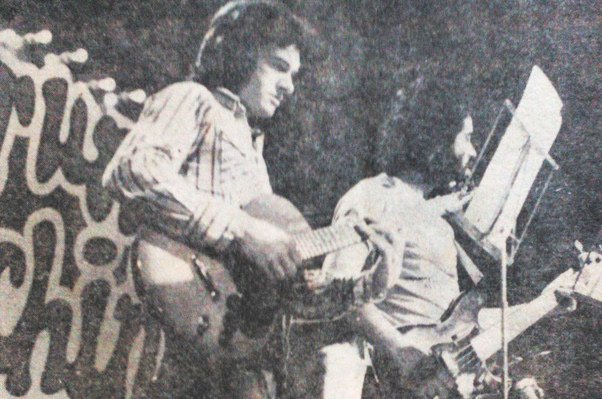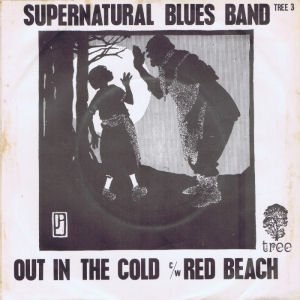Music
Lush bluesy jams, soulful guitar, country blues, epic jams, soaring guitars, soulful slow blues jam with a touch of Floyd or smooth and cruisy electric guitar blues.
Samples: Ebb & Flow Eva Freja The Big Wide Open Driving Home Arwen
John O’Connor’s Production Music Library is available for licensing through New Zealand music production and publishing company Woodcut Productions.
“Rediscovering a Wellington guitar hero”
Karl du Fresne July 2020
“In 1968 I was the bass guitarist (not a very good one, I regret to say) in a Wellington band called the Regency Set. I don’t remember much about most gigs we played, but one that stuck in my memory was a Friday night dance in the Khandallah Town Hall where we shared the bill with an outfit called the Supernatural Blues Band.
It was, to put it mildly, an incongruous mix. We wore jackets and ties and played a middle-of-the-road repertoire that erred on the side of mature. (I was the youngest in the band by several years.) We got plenty of bookings but no one would have called our music edgy. Build Me Up, Buttercup was about as raunchy as we got.
The Supernatural Blues Band, on the other hand, wore jeans and sneakers and looked slightly disreputable. They were an antipodean extension of the British blues boom – think John Mayall, Eric Clapton and Peter Green – that was then in full cultish cry.
To use an automotive analogy, if the Regency Set were a bourgeois Hillman Hunter, the Supernatural Blues Band were a Ford twin-spinner with a couple of missing hubcaps and primer paint on the mudguards.
The SBB had a bunch of fans who had come only to hear them and who regarded us, when they acknowledged us at all, with eye-rolling disdain. Whoever selected the bands for the night either had a mischievous sense of humour or was trying to cover the field. But as my musician brother recently reminded me, bizarre combinations were not uncommon back then: Jimi Hendrix once shared a bill with the Monkees, and the Rolling Stones toured New Zealand in 1965 with Roy Orbison.
Anyway, the point of this reminiscence (trust me, I’m getting there) is that the star of the Supernatural Blues Band – who later simplified their name to the Supernatural – was an uncommonly talented teenage lead guitarist and singer named John O’Connor.
I vaguely recall that O’Connor was then still at school, or perhaps I just made that up, but his playing was masterful. He had a natural feel for the blues and coaxed sounds out of his Jansen Beatmaster guitar (remember, those were the days when the import substitution policy made it difficult to acquire a Fender or Gibson, and most guitarists had to make do with inferior, locally-made lookalikes) that made it sound damned-near respectable.
It didn’t surprise me that he went on to enjoy an illustrious career in music, though he never acquired the reputation he deserved. When I next heard him play, in a steamy and crowded Wellington club called The Cabin during the mid-1970s, he was with the fondly remembered Wellington funk band Redeye, whose members formed the core of an elite group that provided backing on recording sessions – you can hear them on the Mark Williams hits Yesterday Was Just the Beginning of My Lifeand It Doesn’t Matter Anymore, among others – and the TV shows Grunt Machine and Ready to Roll.
A Google search indicates that in the ensuing decades, O’Connor evolved into a player of consummate versatility and professionalism, touring and recording not only with rock and blues luminaries (BB King, Bo Diddley, Chuck Berry) but also with Kiri Te Kanawa, Ron Goodwin and the NZSO.
But it wasn’t until last Friday night, when the Laura Collins Back Porch Blues Band played to a full Carterton Events Centre, that I again heard him playing live. I’d heard the band before, albeit with a different guitarist, and knew to expect a good show, but O’Connor’s virtuoso playing added an exhilarating new dimension to their sound. I don’t think it’s an exaggeration to describe him as world-class.
The soulful feel evident in the Khandallah Town Hall more than a half a century ago is still there, in spades, but it’s combined with dazzling flair and technical skill. (It probably helps that the Jansen Beatmaster has been replaced by a semi-hollowbodied Gibson. For the benefit of guitar nerds, it looked like an ES 336, although I couldn’t be sure from where I was sitting at the back of the room.)
And my point in writing this is? Simply to indulge in a bit of self-vindication. O’Connor mightily impressed me in 1968 and it was a real pleasure to rediscover him in 2020, still playing his heart out.
In singling him out, I certainly don’t mean to downplay the contribution from the rest of the Back Porch Blues Band (who actually play a lot of other stuff besides blues). Keyboard player Wayne Mason’s impressive mastery of the blues idiom, and especially of New Orleans-style rolling boogie-woogie piano, may surprise those who remember him from the Waratahs and (going back into the mists of antiquity) the Fourmyula. George Barris on upright bass is another respected veteran with nothing to prove, although I did wonder whether a bass guitar would have had sharper definition and cut-through. Pete Cogswell is unobtrusive but rock-solid on drums and the exuberant Laura Collins does much more than just sing, although she does that with power and grit.
All in all, a tight band of redoubtable old hands who still get an obvious charge out of playing together, and who communicate that energy and enthusiasm to their audience. Even without O’Connor, they were a great band; with him, they’re even better.”

















